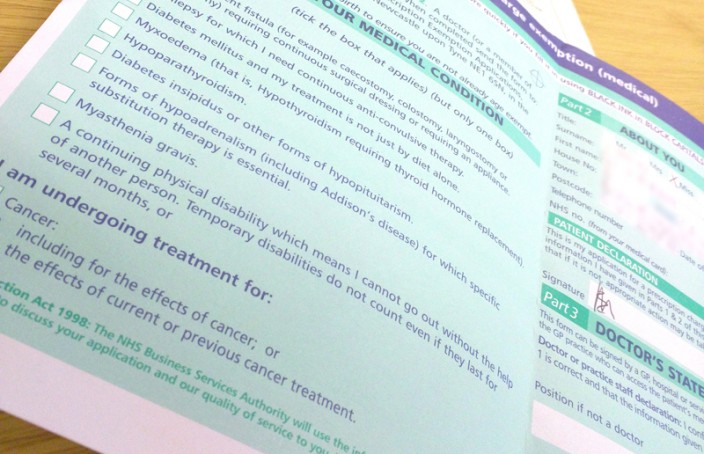If you receive free medication to manage your diabetes in England, and you do not have a valid Medical Exemption Certificate, you could be in for a sting.
Users of our Diabetes Forum have recently felt the force of the NHS Business Service Agency for collecting their medication without having a valid certificate – and received charges for it.
One user, Jimski, wrote: “I have just received one in the post, for £124.15…needless to say I am not that happy about it. I was told by a lady on the phone a similar story to others here, you are entitled to free prescriptions but only if you have the medical exemption certificate. I have never been asked for one, and I have been diabetic since 1986 and with the NHS since 1992. The GP has never told me about one and as others have said the pharmacist has always just said ‘tick that box’.”
Geminigirl added: “I received one of these letters yesterday threatening they had no record of my exemption certificate and that I had filled two prescriptions in November, each with two items on and that I now I owed them over £160 with additional charges which were added as fines! The tone was horrid and could panic people. I was incensed!”
So, it appears the Business Service Agency, who took charge of checking exemptions in 2014, is on a crackdown of people looking to defraud the NHS and receive medicine for free without proper exemption.
It also seems that many people with diabetes, particularly type 1 diabetics that require medicine such as insulin to survive, are becoming the targets of their debt collection.
Why is this all new to me?
The Business Service Authority assumed control of the certificates in 2002, and you will not be registered on their system if you did not have a valid certificate before then. You will also not have been reminded to get one.
With a much more thorough system being used to check exemptions – it was previously done locally – the Business Service Authority are coming down on people claiming free medication without this certificate.
This is why having a certificate is now so important as to avoid hefty charges that you may have not been aware about.
Who decides if I am entitled to a Medical Exemption Certificate?
Despite its conception in 1968, many diabetics have been claiming their medication for free without the certificate, and without any knowledge it was required to do so.
This highlights a lack of communication between GPs, pharmacies, the NHS and anyone else dealing with a diabetic patient eligible for free medication.
In November 2009, an independent review was submitted to government ministers implementing exemption from prescription charges to people with long-term conditions, such as diabetes.
When discussing whether a patient qualified for exemption, Professor Ian Gilmore wrote: “Many consider GPs to be well placed to make the judgement about whether a patient qualifies or not for exemption because of their central role in managing long term conditions.”
In Gilmore’s letter to the Secretary of State, he advised: “The main issue with a broad definition of long term condition is that it introduces the need for judgement. Someone has to judge whether the patient’s condition meets the definition.
“In my view, this is a matter for clinical judgement and in most cases, though not always, it is likely that the patient’s General Practitioner (GP) will be best placed to fulfil this role.”
GPs should be the ones to inform your of your entitlement to free medication, and while this is likely to have been the case with many people, it appears some patients have not had this explained to them.
If you have just been diagnosed with diabetes, or another long-term condition in which you require regular medication, you will have enough to digest without contemplating how to avoid getting charged for medicine.
Take the initiative
If you have type 1 diabetes, or are otherwise entitled to free medication, it is best to take the initiative with your GP and ask for a FP92A application form if you don’t have a valid certificate.
You have to fill in parts one and two and ensure your GP or an authorised member of your surgery confirms your information is correct.
If you have not been told about a Medical Exemption Certificate before, it can be very confusing, as lizdeluz attests to, writing: “I’m wondering if I need to act! I was given an exemption certificate in 1985 when diagnosed but I don’t know where it is now. I’ve never been required to sign my prescription or produce the certificate or apply for a new one. I think this task could easily be taken out of the hands of T1’s, as GPs have a clear record, (don’t they?), of their T1 patients. It’s not as if T1’s don’t have enough to do to look after their condition, and surely it would be more efficient for GPs to vouch for them?”
If you require free medication and you don’t have a Medical Exemption Certificate – go to your GP and ask for one now.
*** UPDATE (April 2015): It has been announced following a campaign by Diabetes UK that people with diabetes who have been unfairly fined for claiming free prescriptions will be reimbursed. This comes after Health Minister Dan Poulter asked the NHS Business Service Authority to change the system in March so people with diabetes were no longer being fined unfairly.
If you have been sent a penalty charge, it will be cancelled if you submit an application for a medication exemption certificate within 60 days. Alternatively, if you can confirm you have received your exemption certificate, your charge will be revoked.
If you have already paid a penalty charge, you will be reimbursed for the total paid, but the cost of the prescription will not be refunded.



